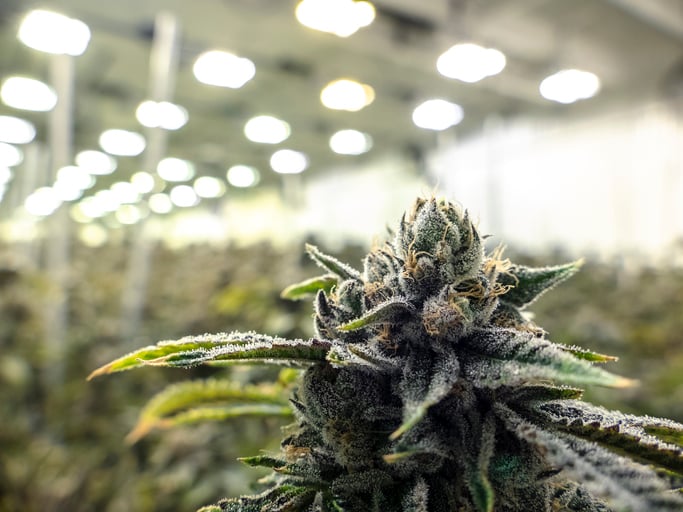Excuse me, bartender. I'll have whatever the CEO of Constellation Brands (STZ +3.67%) is having.
In a recent interview with Jim Cramer, Bill Newlands, the CEO leading the company behind Modelo and Corona, said top-line revenue at Canopy Growth (CGC 0.85%) could reach $1 billion annualized by the end of its fiscal year. Here's why he might be disappointed.

Image source: Getty Images.
A tall order
Last year, under a different CEO, Constellation Brands raised its equity stake in Canopy Growth to 38% by pouring $4 billion into the Canadian cannabis producer. While it's only natural for the current CEO to say encouraging things about his company's giant investment, Newlands may have made a promise that Canopy can't possibly keep.
Meeting this expectation would require net revenue to triple if Newlands meant CA$1 billion, or quadruple if we're talking about U.S. dollars. Newlands pointed out that cannabis sales in Canada are already on pace to hit an annualized CA$5 billion to CA$6 billion, and by the end of the year the company should be able to market cannabis-infused edibles and beverages.
This isn't alcohol
If you've ever tried making your own craft beer, you probably know it's a lot of work and a lot more expensive than going to the store for a six-pack of Corona. The exact opposite is true for cannabis. A hobbyist with a day job and a spare bedroom can produce several kilograms of top-quality cannabis annually at a lower cost than any licensed producer.
Odds against going to jail for selling illicit marijuana, zero federal regulation, very little state regulation, and fierce competition for customers are the reasons some U.S. states have the fastest-growing marijuana sales on the planet. These conditions don't exist anywhere else, and they're even disappearing in states like California.
California is learning about the illicit market's advantages the hard way. Thanks to ill-conceived plans to heavily tax and regulate the legal cannabis industry, statewide cannabis tax revenue reached less than half the amount the state expected at the beginning of 2018.
According to New Frontier Data, around 80% of cannabis sales in California are coming from the illicit market, and the same thing is happening in Canada. Thanks to taxes and regulations, consumers are paying 49% more for a gram of licensed cannabis than they pay for the unlicensed stuff. As a result, just 21% of Canada's cannabis sales in the fourth quarter were licensed.

Image source: Getty Images.
What needs to happen
Newlands wasn't wrong about the size of the Canadian market, according to Statistics Canada -- cannabis spending reached an annualized CA$5.9 billion during the last three months of 2018. Unfortunately for Canopy and Constellation Brands, sales of licensed cannabis reached an annualized CA$1.2 billion and they have already stopped rising.
Total retail cannabis sales peaked in December at CA$55.9 million, then fell to CA$53.4 million in January. If licensed cannabis sales continue stagnating, Canopy will need to acquire nearly all of its competitors to achieve CA$1 billion in net revenue.
Europe and edibles to the rescue?
Investors expecting major contributions from Canopy's new international operations should probably brace for disappointment. Government-run medical marijuana programs in Europe struggle to compete with well-established illicit markets, too. International sales reached just CA$2.7 million during the fourth quarter, and there's little chance they'll put Canopy over the CA$1 billion line less than a year from now.
Health Canada plans on allowing sales of edibles, infused beverages, topicals, and extracts no later than Oct. 17 of this year. Just because retail outlets will probably be able to sell these products doesn't mean many customers will want to pay extra for them.
Edibles in lightly regulated U.S. states generally contain 100 mg of THC, the psychoactive ingredient in cannabis, per serving. That's enough to make a casual consumer think they're about to die, but it's also barely enough to do the job for most daily users. Health Canada wants no more than 10 mg of THC in any package of edibles, severely limiting their sales potential.
Regulations make THC-infused alcoholic beverages a complete nonstarter in Canada. Some investors are hopeful about nonalcoholic beverages infused with CBD, marijuana's nonpsychoactive compound. The problem here is that CBD generally makes people sleepy, which isn't a terrific selling point for expensive new beverages.

Image source: Getty Images.
Looking ahead
As long as Health Canada insists on regulating the licensed cannabis market to death, there's no way that Canopy will be able to generate annualized revenue above CA$1 billion. Sales just aren't growing that fast, and many of Canopy's new medical customers quickly migrate to less expensive unlicensed options after unsatisfying experiences with its Tweed brand.
By the end of the current fiscal year, annualized net revenue might double from the CA$332 million run rate Canopy achieved during the fourth quarter of 2018. For that to happen, though, the company needs to get awfully lucky.
Canopy Growth and its peers are pumping tons of cannabis into a market that already has excess capacity. Market prices for the agricultural commodity will probably fall further over the next few quarters, making it impossible for Canopy Growth -- or any Canadian producer -- to record CA$1 billion in annual sales.







